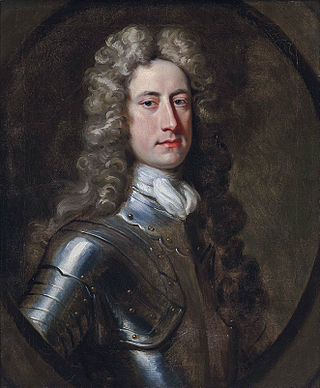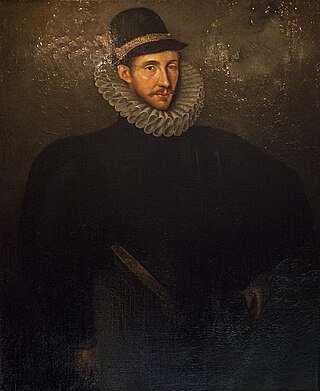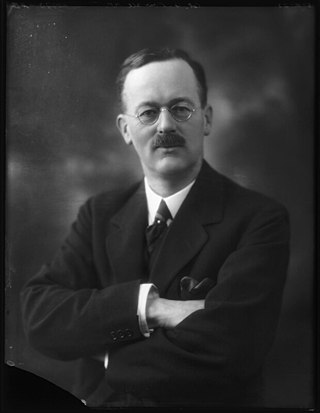Related Research Articles

William Stanhope, 1st Earl of Harrington, PC was a British statesman and diplomat.

Earl of Hardwicke is a title in the Peerage of Great Britain. It was created in 1754 for Philip Yorke, 1st Baron Hardwicke, Lord High Chancellor of Great Britain from 1737 to 1756. He had already been created Baron Hardwicke, of Hardwicke in the County of Gloucestershire, in 1733, and was made Viscount Royston at the same time as he was given the earldom. These titles were also in the Peerage of Great Britain.

Spencer Compton, 2nd Earl of Northampton, styled Lord Compton from 1618 to 1630, was an English soldier and politician who sat in the House of Commons from 1621 to 1622. He became a peer by writ of acceleration in 1626 and by inheritance in 1630. He fought in the Royalist army and was killed in action at the Battle of Hopton Heath.

Fulke Greville, 1st Baron Brooke was an Elizabethan poet, dramatist, and statesman who served in the House of Commons at various times between 1581 and 1621, when he was raised to the peerage.

Philip Martin Dunne is a British politician who served as the Member of Parliament (MP) for the Ludlow constituency in Shropshire from 2005 to 2024. He is a member of the Conservative Party.
Sir Anthony Cooke, KB was an English humanist scholar. He was tutor to Edward VI.

Victor Albert George Child Villiers, 7th Earl of Jersey, was a British banker, Conservative politician and colonial administrator from the Villiers family. He served as Governor of New South Wales between 1891 and 1893.
Sir Hugh Conway, was a member of the royal household of king Henry VII who served in a number of official posts including Lord High Treasurer of Ireland and Treasurer of Calais.

Thomas Wodehouse Legh, 2nd Baron Newton PC, DL was a British diplomat and Conservative politician who served as Paymaster General during the First World War.

Sir Charles Philips Trevelyan, 3rd Baronet was a British Liberal Party, and later Labour Party, politician and landowner. He served as President of the Board of Education in 1924 and between 1929 and 1931 in the first two Labour administrations of Ramsay MacDonald, the first Labour Prime Minister.
Captain Philip Russell Rendel Dunne, Lord of the Manor of Leinthall Earls, MC was an English soldier and politician.

Admiral Sir Sydney Colpoys Dacres, was an officer of the Royal Navy who saw service during the Greek War of Independence, when he was involved in an attack on the Turkish forces at Morea, and later during the Crimean War. Born into a substantial naval dynasty during the Napoleonic Wars, he eventually rose to the rank of Admiral and became First Naval Lord. His only significant action as First Naval Lord was to press for the abolition of masts. He went on to be Visitor and Governor of Greenwich Hospital.
Geoffrey Cecil Twisleton-Wykeham-Fiennes, 18th Baron Saye and Sele was an English soldier and Liberal politician from the Twisleton-Wykeham-Fiennes family. He served as Comptroller of the Household between 1912 and 1915.
Sir Thomas Raymond Dunne, was the Lord Lieutenant of Hereford and Worcester from 1977, then from 1998 the Lord Lieutenant of Worcestershire until 2001 and the Lord Lieutenant of Herefordshire until 2008.

Admiral Sir George Michael Zambellas, is a British retired Royal Navy officer. He was the First Sea Lord and Chief of the Naval Staff from April 2013 until he handed over duties to Admiral Sir Philip Jones in April 2016.

Admiral Sir Joseph Sydney Yorke KCB was an officer of the Royal Navy. As a junior officer he saw action at the Battle of the Saintes in April 1782 during the American Revolutionary War. He commanded HMS Stag at the defeat of the Dutch fleet in August 1795 during the French Revolutionary Wars and went on to be First Naval Lord during the closing stages of the Napoleonic Wars.
Lieutenant-Colonel Edward Marten Dunne was a British army officer and Liberal politician.

Lieutenant-Colonel Sir Assheton Pownall was a British Conservative Party politician who served as Member of Parliament for Lewisham East from 1918 to 1945.
Sir Simon Montford was an English Lord of several manors who was executed for treason.
John Murray Mordaunt was an English first-class cricketer, British Army officer and shipbuilder.
References
- 1 2 "Dunne, Sir Martin", Who's Who (online ed., Oxford University Press, December 2018). Retrieved 9 June 2019.
- ↑ Robert Waller and Byron Criddle, The Almanac of British Politics , 8th ed. (London and New York: Routledge, 2007), p. 640.
- ↑ Supplement to the London Gazette , 29 December 2012 (issue 60367), p. 3